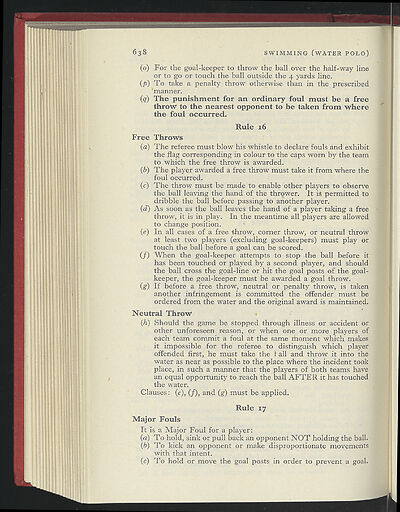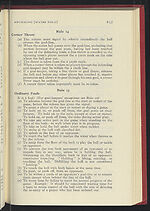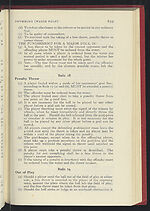1952-53
(670)
Download files
Complete book:
Individual page:
Thumbnail gallery: Grid view | List view

638
SWIMMING (WATER POLO)
(o) For the goal-keeper to throw the ball over the half-way line
or to go or touch the ball outside the 4 yards line.
(p) To take a penalty throw otherwise than in the prescribed
kmanner.
(q)
The punishment for an ordinary foul must be a free
throw to the nearest opponent to be taken from where
the foul occurred.
Rule 16
Free Throws
(a) The referee must blow his whistle .to declare fouls and exhibit
the flag corresponding in colour to the caps worn by the team
to which the free throw is awarded.
(b) The player awarded a free throw must take it from where the
foul occurred.
(c) The throw must be made to enable other players to observe
the ball leaving the hand of the thrower. It
is
permitted to
dribble the ball before passing to another player.
(d) As soon as the ball leaves the hand of a player taking a free
throw, it is in play. In the meantime all players are allowed
to change position.
(e)
In all cases of
a
free throw, corner throw, or neutral throw
at least two players (excluding goal-keepers) must play or
touch the ball before a goal can be scored.
(f)
When the goal-keeper attempts to stop the ball before it
has been touched or played by a second player, and should
the ball cross the goal-line or hit the goal posts of the goal-
keeper, the goal-keeper must be awarded a goal throw.
(g) If before a free throw, neutral or penalty throw, is taken
another infringement is committed the offender must be
ordered from the water and the original award is maintained.
Neutral Throw
.
q
(h) Should the game be stopped through illness or accident or
other unforeseen reason, or when one or more players of
each team commit a foul at the same moment which makes
it impossible for the referee to distinguish which player
offended first, he must take the
r
all and throw it into the
water as near as possible to the place where the incident took
place, in such a manner that the players of both teams have
an equal opportunity to reach the ball AFTER it has touched
the water.
Clauses:
(e), (f),
and (g) must be applied.
Rule 17
Major Fouls
It is a Major Foul for a player:
(a) To hold, sink or pull back an opponent NOT holding the ball.
(b) To kick an opponent or make disproportionate movements
with that intent.
(c) To hold or move the goal posts in order to prevent a goal.
11
SWIMMING (WATER POLO)
(o) For the goal-keeper to throw the ball over the half-way line
or to go or touch the ball outside the 4 yards line.
(p) To take a penalty throw otherwise than in the prescribed
kmanner.
(q)
The punishment for an ordinary foul must be a free
throw to the nearest opponent to be taken from where
the foul occurred.
Rule 16
Free Throws
(a) The referee must blow his whistle .to declare fouls and exhibit
the flag corresponding in colour to the caps worn by the team
to which the free throw is awarded.
(b) The player awarded a free throw must take it from where the
foul occurred.
(c) The throw must be made to enable other players to observe
the ball leaving the hand of the thrower. It
is
permitted to
dribble the ball before passing to another player.
(d) As soon as the ball leaves the hand of a player taking a free
throw, it is in play. In the meantime all players are allowed
to change position.
(e)
In all cases of
a
free throw, corner throw, or neutral throw
at least two players (excluding goal-keepers) must play or
touch the ball before a goal can be scored.
(f)
When the goal-keeper attempts to stop the ball before it
has been touched or played by a second player, and should
the ball cross the goal-line or hit the goal posts of the goal-
keeper, the goal-keeper must be awarded a goal throw.
(g) If before a free throw, neutral or penalty throw, is taken
another infringement is committed the offender must be
ordered from the water and the original award is maintained.
Neutral Throw
.
q
(h) Should the game be stopped through illness or accident or
other unforeseen reason, or when one or more players of
each team commit a foul at the same moment which makes
it impossible for the referee to distinguish which player
offended first, he must take the
r
all and throw it into the
water as near as possible to the place where the incident took
place, in such a manner that the players of both teams have
an equal opportunity to reach the ball AFTER it has touched
the water.
Clauses:
(e), (f),
and (g) must be applied.
Rule 17
Major Fouls
It is a Major Foul for a player:
(a) To hold, sink or pull back an opponent NOT holding the ball.
(b) To kick an opponent or make disproportionate movements
with that intent.
(c) To hold or move the goal posts in order to prevent a goal.
11
Set display mode to:
![]() Universal Viewer |
Universal Viewer | ![]() Mirador |
Large image | Transcription
Mirador |
Large image | Transcription
| Games and sports in the army > 1952-53 > (670) |
|---|
| Permanent URL | https://digital.nls.uk/248826218 |
|---|
| Description | 'Games and Sports in the Army' was an annual publication produced by the British War Office between the 1930s and 1960s. This included the Second World War. It outlines the rules and regulations for games and sports played by members of the armed forces. It features names and photographs of team members, and examples of contemporary advertising. |
|---|---|
| Shelfmark | GWB.52 |

